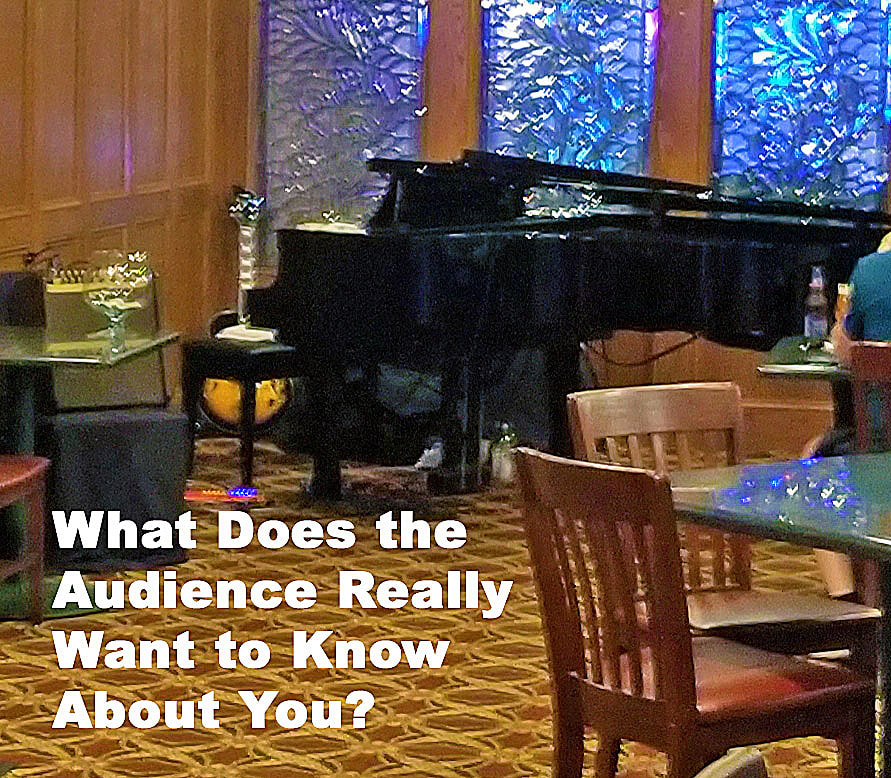Funny thing is that many of those same things apply for a musician’s relationship with their audience.
What does the audience really want to know about you?
Confidence
From the minute you walk in to the venue to the moment the wait staff notices you walking out at the end of the night, you must exude a quiet confidence that you know what you’re doing, that you know how to do it, and that you are at the top of your game.
Are you confident?
Do you have the right to be confident yet?
Have you put in the hours, paid the dues?
Anything less than confident doesn’t work.
Groove
They want to know if you can dance with your fingers and voice.
It’s not about the notes you play. It’s about where you put them.
Tense people can’t groove.
Confidence helps a groove but isn’t an end-all be-all.
Thinking gets in the way of groove.
If you can’t hit a groove in the first few bars, the jig is up.
They’ll know that you are pretending.
So . . . can you groove for a few hours?
What Are You?
You better exude the stank that you are a musician and there better be no question about it.
For example, I can usually tell how good a guitarist is by the way they take their instrument out of their case. On some level, so can your audience.
They are not there to hear a teacher, a dad, a mom, a sob story, a cry for help, or an unrehearsed practice session.
They want to be impressed.
As the Hamburg club owner yelled at the unknown Beatles whenever they started to run out of energy during a six-hour nightly gig, “Mach shau!” (“Make a show”).
Can you “Mach shau”?
Skill Set
For starters, can you make music?
Can you remember everything you need on the gig and start on time?
Can you relate to people?
How many songs do you know?
Can you look strangers in the eye, have a conversation, give them a reason to smile or engage?
Can you improvise and make any situation work?'
Do you know where your lane is? Can you stay in it and step out when needed?
Can you do all these things consistently for a few hours . . . because they want to know if you can.
A Funny Thing Happened on My Way to the Gig . . . .
Can you consistently be funny at your own expense? Things will go wrong on a gig. Smile.
The audience doesn’t want to see you struggle with anything – they want a pro.
Don’t Hate the Player, . . . .
But they will if you don’t exhibit grace under pressure.
Can you be unflappable . . . . because as much as people like the spectacle of watching someone fall off the high wire, they are even more thrilled by someone who, when they slip off the wire, doesn't crash to the ground but instead flies.
Lean In or Fall Back
They want to experience your moods through your music.
And there has to be variety.
Music is about emotion, not notes, so if you’re still concentrating on the notes, the mechanics will overpower the feels.
Are you comfortable and adept putting emotion into your music?
Triangulation
It’s about the triangle, with you, the music, and the audience at the three corners. Make everything else melt away.
Play what they want to hear, not what you want to play.
Ask them what they want to hear.
That means you’ll need a lot of material under your belt.
Right now, I have 1,700 songs in my book – and I’m always learning new material.
It's not enough to convince them that you know every song under the sun.
They need to leave convinced that you ARE the sun.
Similarities
They want to know how similar you are to their musical heroes.
The Most Important Thing They Want to Know
Each person listening to you wants to know and believe that you are dying to play what they want to hear but that you want to play to only them.
As if the two of you are the only two people in the room.
As if the sounds you produce are heard by everyone but only intended for them.
If you have never performed for just one person, you need to do this several times as soon as possible and notice how different it feels performing that way. That sensation – along with some great music - is what they really want to feel.

 RSS Feed
RSS Feed